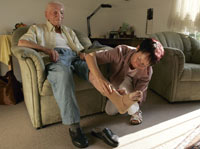
More than one in five councils in England is illegally charging service users for reablement packages of care, research by Community Care has found.
Our investigation has prompted the government to promise guidance instructing councils not to charge, while one local authority, West Sussex, has suspended its charges and is seeking legal advice from the Department of Health.
A Freedom of Information request, answered by 96 of England’s 152 councils, found 22% levied a charge for reablement.
Many of the descriptions of reablement services provided by the councils surveyed met the definition of intermediate care, which must be provided free for the first six weeks under the Community Care (Delayed Discharges etc) Act (Qualifying Services) (England) Regulations 2003.
Cate Searle, community care lawyer at Martin Searle Solicitors, said: “Simply calling intermediate care by another name does not allow a local authority to charge for it.”
Sector leaders were highly critical of the charges.
Louise Lakey, policy manager at Alzheimer’s Society, said: “Services such as intermediate care are vital for people with dementia especially considering the current economic climate. It enables people to stay out of hospital and residential care – which are very costly – and receive care in the community instead. It should not be charged for.”
Reablement has been proven to help councils contain care costs by helping people stay independent. Association of Directors of Adult Social Services president Richard Jones warned charges would blunt this effect. “We want to incentivise people to benefit from a reablement package,” he said. “That’s in our interest as a council, it’s in our partners’ interests and the interests of those people receiving the service. Charging people for it isn’t sensible or sustainable.”
Marije Davidson, public affairs manager for disability network Radar, said: “Local authorities are denying people living with ill-health, injury or disability the very services that enable them to take an active part in society.”
Many of the councils who charged for reablement said their service did not qualify as intermediate care. One director said: “The reablement service is for people with a social care need, and is not for those with health needs.”
The DH issued guidance last year, Intermediate Care – Halfway Home, which stated that social care reablement “fulfilled the intermediate care function” and reiterated that intermediate care should not be charged for. However, this guidance was “very poorly drafted” and “inconsistent in its messages”, said Community Care’s legal expert, Ed Mitchell and may have allowed councils to think charging for reablement was legal.
Speaking to Community Care at this week’s Liberal Democrat annual conference, care services minister Paul Burstow said: “We will issue fresh guidance to tell councils not to charge for reablement services.”
He also promised extra funding for reablement services. “The best local authorities are running reablement services that ensure people no longer need care. It’s about giving people back their freedom,” Burstow added.
Social workers should blow the whistle on councils’ reablement charges
Reablement charges: councils to face massive repayment bill
Legal expert says Community Care has revealed serious legal failings on reablement
Service user pain fails to disturb political party festivities
What is reablement?
Reablement is one of councils’ main tools in managing the costs of an ageing population and will be important as authorities face cuts in government funding of 25% or more from 2011-15.
Providing personal care, help with daily living activities and other practical tasks, usually for up to six weeks, reablement encourages service users to develop the confidence and skills to carry out these activities themselves and continue to live at home.
It tends to be provided to people who have just been discharged from hospital or are otherwise entering the care system following a crisis.
A 2007 study for the Department of Health’s care services efficiency delivery network found that up to 68% of people no longer needed a home care package after a period of reablement, and up to 48% continued not to need home care two years later.
Services are often delivered by in-house council care teams, rather than the independent sector, and involve home care staff working in tandem with physiotherapists, occupational therapists and other health professionals.
Almost all of England’s councils are planning, implementing or running a reablement service.
How reablement saves councils money
Council reablement FOI responses and reactions 23 Sept
What do you think? Join the debate on CareSpace
Keep up to date with the latest developments in social care. Sign up to our daily and weekly emails


 A trauma-informed approach to social work: practice tips
A trauma-informed approach to social work: practice tips  Problem gambling: how to recognise the warning signs
Problem gambling: how to recognise the warning signs 




 Find out how to develop your emotional resilience with our free downloadable guide
Find out how to develop your emotional resilience with our free downloadable guide  Develop your social work career with Community Care’s Careers and Training Guide
Develop your social work career with Community Care’s Careers and Training Guide  ‘Dear Sajid Javid: please end the inappropriate detention of autistic people and those with learning disabilities’
‘Dear Sajid Javid: please end the inappropriate detention of autistic people and those with learning disabilities’ Ofsted calls for power to scrutinise children’s home groups
Ofsted calls for power to scrutinise children’s home groups Seven in eight commissioners paying below ‘minimum rate for home care’
Seven in eight commissioners paying below ‘minimum rate for home care’
 Facebook
Facebook X
X LinkedIn
LinkedIn Instagram
Instagram
Comments are closed.